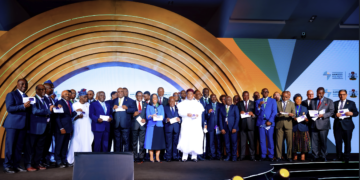The Nigeria Customs Service, in collaboration with the Ministry of Marine and Blue Economy, has spearheaded efforts to revolutionize the nation’s maritime sector.
Notable attendees at the meeting included Comptroller-General of Customs, Bashir Adewale Adeniyi MFR; Minister of Marine and Blue Economy, Gboyega Oyetola; Minister of Transportation, Senator Said Ahmed Alkali and the Managing Director of the Nigerian Railway Corporation (NRC), Fidet Okhiria who also joined virtually.
In a joint press statement, signed on Monday, January 15, 2024, by CSC Abdullahi Maiwada, the National Public Relations Officer of the Nigeria Customs Service, Ismail Omipidan, Media Aide to the Minister of Marine and Blue Economy, revealed a significant step towards a more streamlined and technology-driven maritime future for Nigeria.
According to the statement, the focal point of discussion centered around leveraging Non-Intrusive Inspection Technology (NIIT) to enhance operational efficiency within Nigerian seaports.
Some critical resolutions that emerged from the strategic meeting aimed at reshaping the landscape of trade facilitation and port operations.
The statement said part of the critical resolutions made during the meeting include recognizing the crucial role of Non-Intrusive Inspection Technology (NIIT) in alleviating port congestion.
The meeting, however, mandated the Comptroller-General of Customs, CGC Bashir Adewale Adeniyi MFR, to prioritize cargo scanning over traditional physical examination methods.
As for the repair and optimization of scanners, immediate actions were reported to have been endorsed to rectify and optimize existing scanners at major ports such as Apapa, Tincan Island, Onne, and PTML – while also deploying mobile scanners to expedite cargo inspections.
On the part of the Nigerian Railway Corporation, the statement showed that the NRC had pledged ongoing commitment to freight cargoes to Inland container depots/dry ports, aiming to reduce congestion at major ports.
NRC’s prompt plans, according to the statement, were unveiled for efficient container evacuation from Port Harcourt to Aba while also envisaging substantial future extensions for Onne Port.
Deliberating on ‘Bypassing Fixed Scanner during Rail Track Construction,’ which aims to ensure smooth scanning processes during vital infrastructure development, the NRC agreed on a pragmatic approach, bypassing the fixed scanner at Apapa amid rail track construction.
It says, “This collaborative model aims to sustain efficiency and innovation in cargo inspection processes and will also address ‘Public-Private Partnerships for Scanning Installation and Maintenance’ to oversee the installation and maintenance of scanning technology.
The anticipated implementation of the resolutions is poised to positively impact port decongestion, trade facilitation, and overall operational efficiency and competitiveness.






























































